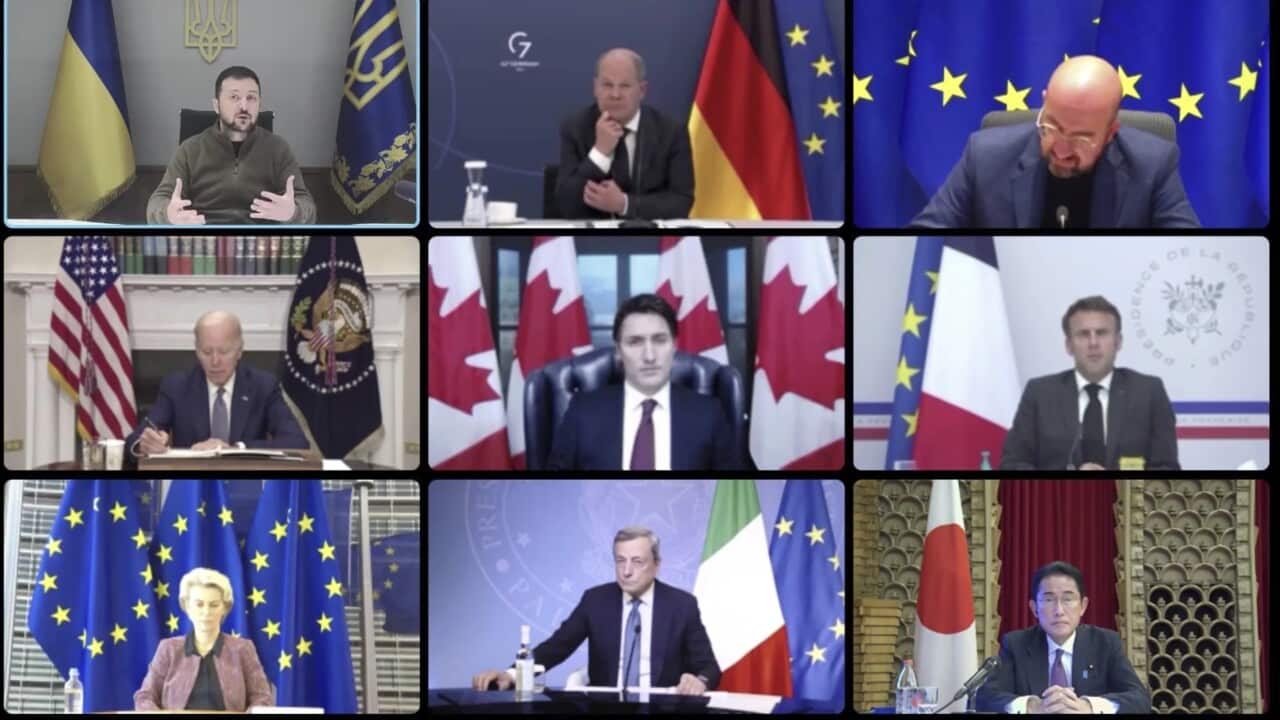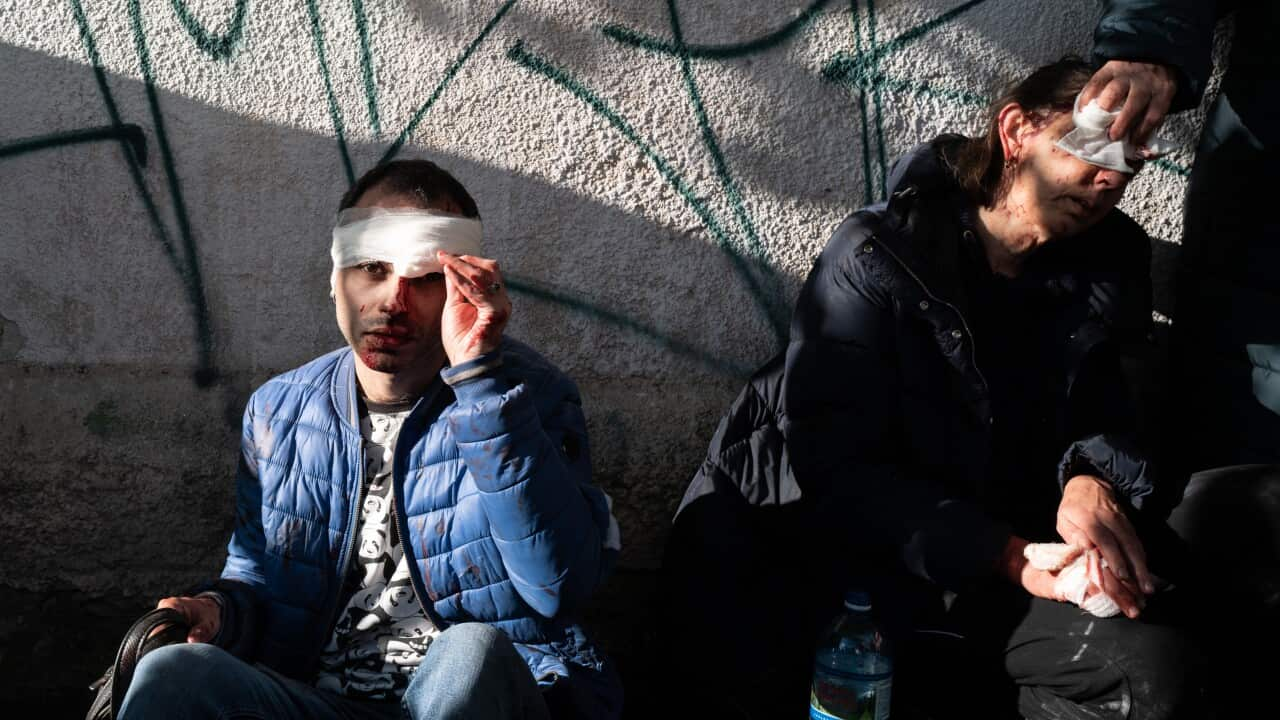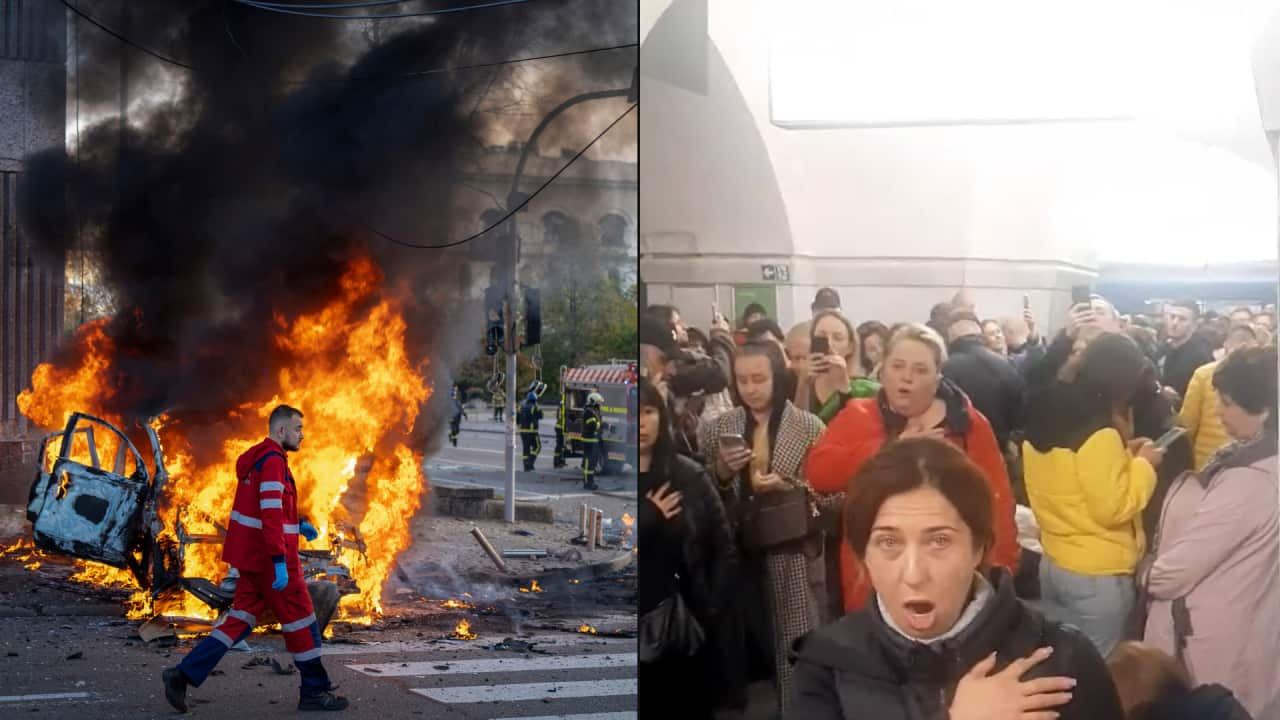Key Points
- Russian officials say they have launched new attacks against military sites and the power network in Ukraine.
- NATO said it was closely monitoring Russia's nuclear forces.
Ukrainian President Volodymyr Zelenskyy appealed to leaders of the Group of Seven nations on Tuesday for more air defence capabilities and the G7 vowed to support Kyiv for "as long as it takes" while warning Russia against any use of nuclear weapons.
NATO said it was closely monitoring Russia's nuclear forces following a string of Russian battlefield defeats in Ukraine and that the allies were also boosting security around key infrastructure after recent attacks on Baltic Sea gas pipelines.
Russian missiles again hit Ukrainian cities but with less intensity than on Monday, when dozens of strikes killed 19 people, wounded more than 100 and knocked out power supplies across the country in Moscow's biggest aerial offensive since the start of its invasion on 24 February.
More missile strikes killed at least one person in the southeastern Ukrainian town of Zaporizhzhia and left part of the western city of Lviv without power, local officials said. Air raid sirens earlier wailed across Ukraine for a second day.
"When Ukraine receives a sufficient quantity of modern and effective air defence systems, the key element of Russia’s terror, rocket strikes, will cease to work," Mr Zelenskyy told G7 leaders at a virtual meeting where he again ruled out peace talks with Russian President Vladimir Putin.
Ukraine on Tuesday received the first of four IRIS-T air defence systems Germany promised to supply, a German defence ministry source said.
The White House later said the United States was speeding up the shipment of sophisticated NASAMS air defenses to Ukraine. Washington has provided more than $26.81 billion worth of security aid to Ukraine during the war.
Mr Zelenskyy's government has mixed gratitude for such aid with pleas for more powerful weapons and faster deliveries.
'Uncontrolled escalation'
The G7 - which groups the United States, Germany, France, Japan, Britain, Italy and Canada - pledged continued "financial, humanitarian, military, diplomatic and legal support...for as long as it takes" to Ukraine, it said in a statement.
It also condemned "indiscriminate attacks on innocent civilian populations" as war crimes and said Mr Putin would be held to account for them.
Moscow, which calls its actions in Ukraine a "special military operation" to eliminate dangerous nationalists and protect Russian-speakers, has accused the West of escalating and prolonging the conflict by supporting Kyiv.
"We warn and hope that they realise the danger of uncontrolled escalation in Washington and other Western capitals," Russian Deputy Foreign Minister Sergei Ryabkov was quoted as saying by RIA news agency on Tuesday.
Kyiv and its Western backers accuse Russia of an unprovoked imperialist land grab in Ukraine.
Belarus, Moscow's closest ally, said it had begun an exercise to assess its "combat readiness" after ordering troops on Monday to deploy with Russian forces near its border with Ukraine. Belarus allowed Russia to use its territory to invade Ukraine but has not sent its own troops across the border.
Mr Zelenskyy denied Minsk's claim that Ukraine planned to attack Belarus but told the G7 he wanted to make sure there was no threat from its northern neighbour, and he called for a mission of international observers to monitor the border area.
Mr Putin, under domestic pressure to ramp up the war as his forces have lost ground since early September, said he ordered Monday's strikes as revenge for an explosion that damaged Russia's bridge to annexed Crimea last weekend.
Residents in the capital Kyiv took cover on Tuesday for a second day deep in the underground metro, where trains were still running.
Viktoriya Moshkivski, 35, and her family were among hundreds of people in the Zoloti Vorota station, near a park where a missile ripped a crater next to a playground on Monday.
"(Putin) thinks that if he scares the population, he can ask for concessions, but he is not scaring us. He is pissing us off," she said as her sons, Timur, 5, and Rinat, 3, sat by her side on a sleeping bag, the younger playing with a King Kong action figure.
Air shield request
Mr Zelenskyy told the G7 that peace can only be achieved if Russian missiles are stopped. He asked the group of wealthy nations to provide an air shield to counter Russia's cruise missiles and combat the rise of "suicide drones" manufactured in Iran.
Ukraine has reported a spate of Russian attacks with Iranian-made Shahed drones over the last three weeks.
Iran denies supplying the drones to Russia, while the Kremlin has not commented.
Ukraine's president and security chiefs met in September to plan ways to counteract Russia's use of "new types of weapons" after Moscow stepped up attacks in Odesa region using Iranian combat drones, the president's office and a regional official said.
Serhiy Bratchuk, spokesperson for Odesa's regional administration, has said the drones could intensify the attacks on Ukraine.
"The enemy is trying to save on missiles... these Shaheds are much cheaper, they can be used much more frequently and in pairs. We are seeing that the enemy can even launch several of these kamikaze drones for one attack," he said.
More strikes
In recent weeks, Moscow has annexed new tracts of Ukraine, mobilised hundreds of thousands of Russians to fight and repeatedly threatened to use nuclear arms, stoking alarm in the West. A European diplomat said NATO was considering convening a virtual summit of the alliance to consider its response.
NATO has not noticed any change in Russia's nuclear posture following the threats, Secretary General Jens Stoltenberg told reporters in Brussels on Tuesday.

Ukraine's emergency services deal with missile strikes in Zaporizhzia, Tuesday 11 October 2022. Credit: State Emergency Service of Ukrai/Cover Images
The alliance will proceed with its annual nuclear preparedness exercise "Steadfast Noon" next week - in which NATO air forces practise the use of US nuclear bombs based in Europe with training flights - without live weapons.
Russia said it continued to launch long-range air strikes on Ukraine's energy and military infrastructure on Tuesday.
Ukrainian Foreign Minister Dmytro Kuleba said the main targets were energy facilities in a campaign planned well in advance and designed to make life unbearable for civilians.
"They've hit many yesterday and they hit the same and new ones today," he wrote on Twitter. Hundreds of settlements around Kyiv, Lviv and elsewhere were still without power on Tuesday, Deputy Interior Minister Yevheniy Yenin said.
The governor of Russia's Belgorod region said on Tuesday that more than 2,000 people had been left without power after Ukraine shelled an electricity substation in the town of Shebekino, on the border with Ukraine's Kharkiv region.
Ukraine did not immediately comment on the incident.












